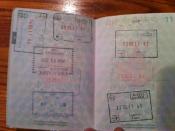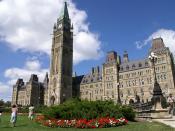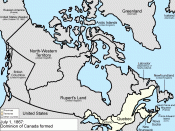When war broke out in Europe in 1914, the United Kingdom joined the fight. As a British Colony, Canada was automatically also at war. By the end of the war, Canada had changed greatly; Canadians had been conscripted from Vancouver to St. John's; Quebec was on the verge of separating; agricultural and industrial production had increased four-fold, and Canada's government had assumed control of Canadians' lives. All these measures and many more reflect on the Canadian Government's desperation, and these show to what extent our government is willing to transform in times of desperation.
With the outbreak of war, Canada was united. Spirits were high, and the Prime Minister had promised the war would be no longer than a few months. He was proved wrong. The war was not the anticipated war of negotiated peace, but a war of attrition, where both sides were unwilling to give in, and peace was nonnegotiable.
This magnified the war's effect on Canada; by 1917, Canada was divided by very clear lines; Quebec was on the verge of separating from Canada as a result of their concerns over bilingual schools in Ontario, but more importantly, the conscription crisis. In 1914, both Anglophone and Francophone leaders including the archbishops of Montreal and Quebec City spoke of the sacred duty of Canadians to answer to Britain's call. Quebec did not limit its export of agricultural products, sending over four million tons of food. Early in the war, after a few major battles, the loss of life among British-Canadian troops was extensive, thus the number of eager recruits dwindled. This was because French-Canadians were the group with the oldest ties to Canada, with the least emotional tie to Britain or France, making them the most reluctant to join, since they felt and were unwelcome in the armed...


